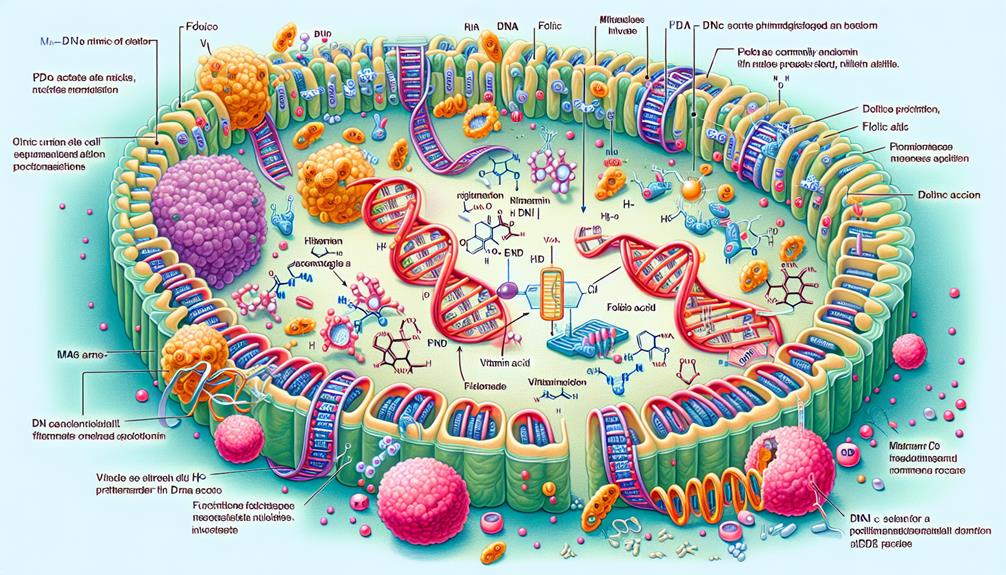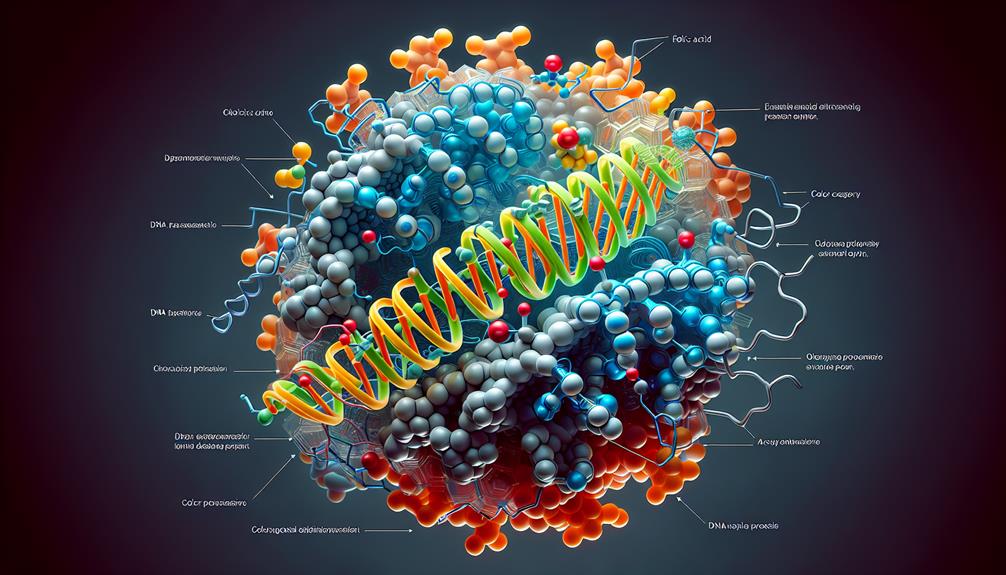







Folic acid, or Vitamin B9, is essential for DNA synthesis. It provides one-carbon units important for accurate replication and genetic information preservation. This vitamin greatly influences key cellular processes, ensuring proper cell division and growth. Folic acid plays a central role in supporting DNA repair mechanisms, maintaining stability and chromosome structure. The interplay with Vitamin B12 in synthesis further enhances its functions in DNA replication and repair. Understanding how folic acid impacts DNA synthesis is essential for realizing its full importance in maintaining cellular health and genetic integrity.
Key Takeaways
- Folic acid provides one-carbon units for nucleotide synthesis in DNA replication.
- It supports accurate DNA replication, repair mechanisms, and genetic information.
- Folic acid aids in regulating gene expression, methylation processes, and nucleotide formation.
- Crucial for stability of genetic information, cell growth, and chromosome structure.
- Works with Vitamin B12 in DNA synthesis, acting as a coenzyme for nucleotide production.
Importance of Folic Acid in DNA
Folic acid plays an important role in facilitating the essential process of DNA replication within cells. Research has shown a link between folic acid levels and the risk of certain cancers. Adequate folic acid intake is associated with a decreased risk of developing colorectal, breast, and other cancers. On the other hand, low levels of folic acid may increase the likelihood of DNA damage and mutations that can lead to cancer.
Folate supplementation benefits extend beyond cancer risk reduction. Folic acid is critical for the synthesis of nucleotides, the building blocks of DNA. By providing an essential methyl group, folic acid aids in the conversion of the amino acid homocysteine to methionine. This process is essential for DNA methylation, a mechanism that regulates gene expression and cellular function. Additionally, folic acid is necessary for the production of red blood cells and supports overall cell growth and division. Ensuring an adequate intake of folic acid is crucial for maintaining the best DNA synthesis and cellular function.
Folic Acids Impact on Cells
Playing an important role in cellular processes, folic acid impacts various functions within cells, influencing DNA synthesis and overall cellular health. Folic acid is essential for cell growth, as it is involved in the production of nucleotides needed for DNA synthesis. Additionally, folic acid plays a significant role in regulating mutation rates by aiding in DNA repair and methylation processes.
Folate metabolism, the process by which folic acid is converted into its active form, is critical for maintaining proper cell function. Disruptions in folate metabolism can lead to adverse effects on cells, potentially increasing cancer risk. Studies have shown that insufficient folic acid levels can result in abnormal DNA synthesis, which may contribute to the development of cancerous cells. Ensuring sufficient folic acid intake is crucial for supporting healthy cell growth and reducing mutation rates that could elevate the risk of cancer.
Role in DNA Replication

In the context of cellular processes, the role of folic acid extends to its involvement in facilitating the accurate replication of DNA molecules. During DNA replication, folic acid plays an important role in providing one-carbon units essential for the synthesis of nucleotides, the building blocks of DNA. This process is essential for ensuring that new cells have the correct genetic information necessary for proper functioning.
Moreover, folic acid is involved in DNA repair mechanisms. When DNA is damaged due to various factors such as UV radiation or chemical agents, folic acid contributes to the repair processes that maintain the integrity of the genetic material. By supporting DNA repair, folic acid helps in preventing mutations that could lead to harmful consequences like cancer.
Furthermore, folic acid is essential for cell growth, including the growth and division of cells during DNA replication. Adequate levels of folic acid are crucial for supporting the rapid cell division required for processes like embryonic development and tissue repair. Therefore, folic acid plays a multifaceted role in DNA replication, repair, and cell growth, highlighting its importance in maintaining cellular health.
Folate and Genetic Material
Folate, an essential B vitamin, interacts intricately with the genetic material within cells, influencing various processes essential for cell function and health. Concerning heredity, folate plays a pivotal role in ensuring the stability and integrity of genetic information passed down from one generation to the next. This vitamin is particularly important for cell division and growth, processes central to heredity and the passing on of genetic traits.
Vitamin B9, or folate, is also closely linked to the structure and function of chromosomes, the thread-like structures found in the cell nucleus that contain genetic material. Folate helps in the synthesis and repair of DNA, the molecule that carries genetic instructions, within chromosomes. By supporting these processes, folate contributes to the maintenance of chromosome stability and overall genomic integrity.
Understanding the intricate relationship between folate, heredity, and chromosomes sheds light on the significant role this B vitamin plays in maintaining the genetic material essential for proper cell function and overall health.
Folic Acid and Methylation Processes

Folic acid is intricately involved in methylation processes, a key biochemical mechanism that regulates gene expression and various cellular functions. Methylation regulation refers to the addition of a methyl group to specific molecules, a process essential for controlling how genes are expressed without altering the underlying DNA sequence. Folate, in the form of active folate (5-methyltetrahydrofolate), acts as a methyl donor in these processes. By donating methyl groups, folic acid participates in the methylation of homocysteine to form methionine, a reaction critical for the synthesis of S-adenosylmethionine (SAMe), a universal methyl donor in numerous methylation reactions. Methylation plays an important role in regulating gene expression, silencing repetitive elements in DNA, and maintaining genomic stability. Additionally, folic acid's involvement in methylation processes influences nucleotide formation, which is crucial for DNA synthesis and repair. Ensuring an adequate intake of folic acid is essential for supporting proper methylation regulation and nucleotide synthesis within the cell.
Link Between Folic Acid and Nucleotides
An essential connection exists between the role of folic acid and the synthesis of nucleotides within the cell. Folic acid plays a critical role in nucleotide formation, which are the building blocks of DNA and RNA. By providing one-carbon units, folic acid contributes to the synthesis of purines and pyrimidines, the essential components of nucleotides. This process is vital for DNA replication, repair, and protein synthesis.
Moreover, folic acid is involved in mitosis regulation, ensuring proper cell division. Nucleotides are necessary for the duplication of genetic material during cell division and play a significant role in regulating gene expression. Adequate folic acid levels are essential for maintaining the integrity of the genetic material and supporting various cellular processes. Deficiencies in folic acid can lead to impaired nucleotide synthesis, affecting DNA replication and repair mechanisms, ultimately impacting gene expression and cell division processes. Ensuring sufficient folic acid intake is crucial for maintaining optimal nucleotide synthesis and overall cellular function.
Deficiency Effects on DNA Synthesis

Insufficient intake of folic acid can greatly impede the process of DNA synthesis within cells, leading to potential disruptions in genetic material replication and repair mechanisms. Folic acid is essential for the synthesis of nucleotides, the building blocks of DNA. When there is a deficiency in folic acid, the production of nucleotides is compromised, hindering DNA replication and repair processes. This can result in an increased risk of mutations and DNA damage, as the cells struggle to maintain the integrity of their genetic material.
DNA repair mechanisms rely heavily on the availability of folic acid to facilitate the synthesis of new DNA strands and ensure proper functioning of enzymes involved in DNA repair processes. Without an adequate supply of folic acid, these repair mechanisms may not function optimally, leading to accumulation of errors in the DNA. Additionally, folic acid deficiency can impact cellular growth and development, as DNA synthesis is vital for cell division and proliferation. Insufficient folic acid levels can thus impede normal cellular functions, ultimately affecting overall health and wellbeing.
Folic Acids Role in Cell Division
Adequate levels of folic acid play an essential role in regulating cell division processes by supporting the synthesis of DNA strands necessary for cellular replication. Within the domain of cell growth, folic acid aids in the progression of mitosis, the phase in which a parent cell divides into two identical daughter cells. This vitamin is critical for proper cellular metabolism, ensuring that the genetic material is accurately duplicated during division.
Moreover, during prenatal development, folic acid is particularly important as it contributes to the rapid cell division and growth required for the formation of tissues and organs in the developing fetus. Deficiencies in folic acid can lead to disruptions in these processes, potentially resulting in birth defects or developmental abnormalities.
Enzymatic Functions in DNA Repair

In the intricate process of DNA repair, enzymes play an important role in identifying and correcting errors within the genetic code. Repair mechanisms rely on a series of biochemical pathways orchestrated by specific enzymes to maintain genomic integrity. These enzymes are essential for detecting DNA damage caused by various sources such as radiation, chemicals, or errors in replication.
Within cellular metabolism, enzymatic reactions drive the repair processes by recognizing specific types of damage like mismatched base pairs or breaks in the DNA strands. Enzymes facilitate the excision of damaged segments and the synthesis of new DNA strands to maintain the original sequence accurately.
Different repair pathways, such as base excision repair and nucleotide excision repair, involve a cascade of enzymatic reactions that coordinate to fix distinct types of DNA lesions. These enzymes act concertedly to uphold the fidelity of the genetic information and preserve the stability of the genome. The intricate interplay between enzymes and DNA repair mechanisms highlights the sophisticated machinery that operates within our cells to safeguard the integrity of our genetic material.
Interplay With Vitamin B12 in Synthesis
Folic acid and vitamin B12 intricately interact in the synthesis processes essential for DNA replication and repair within the cellular environment. Vitamin B12 interaction with folic acid is critical for proper functioning in DNA synthesis. Vitamin B12 acts as a coenzyme in conjunction with folic acid, aiding in the conversion of homocysteine to methionine, an essential step in DNA synthesis. This process is necessary for the production of nucleotides required for DNA replication and repair.
The interplay between folic acid and vitamin B12 is important for maintaining adequate levels of nucleotides for DNA synthesis. Without this interaction, errors in DNA replication and repair can occur, leading to potential genetic mutations. Vitamin B12's role as a coenzyme complements folic acid's functions, ensuring the smooth progression of DNA synthesis processes.






